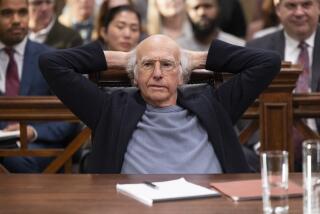Opinion: ‘How I Met Your Mother’ finale: Why you should appreciate the not-so-perfect ending
In 2009, I sent my parents DVDs of “How I Met Your Mother” so that they’d have a better idea of what my life was like as a single twentysomething in the modern urban dating culture. All of the characters reminded me of people I knew (and occasionally of myself), and the show succeeded for nine years because so many other people felt the same way. Given that level of emotional connection, it wasn’t surprising to see social media explode with controversy over the series’ finale, especially considering that love it or hate it, it was certainly not a standard sitcom capper. As the New Republic’s Esther Breger fumed, the ending was “deeply unsatisfying, even infuriating.”
(Warning: spoilers ahead.)
Some context: the pilot of HIMYM began with everymanish Ted Mosby telling his teenage kids about the night he met a woman who we are led to believe is their mother, only to find out at the end of the first episode that she’s their non-familial “aunt,” Robin. Over the course of the rest of the series’ run, Ted and Robin date, break up and become close friends, with Robin eventually marrying Ted’s buddy Barney and Ted continuing on a romantic quest to find the titular Mother.
PHOTOS: The women in Ted’s journey
In the final season, we get to meet and know the mother, fall in love with her, and then, in the final episode via a flash forward to the future, see her dying from an unnamed illness. We see Barney and Robin divorcing and the group of friends that the series revolved around growing apart and losing touch.
Of course, there is good news in the future as well -- successful careers, beautiful children -- but it’s bittersweet, with joyful moments accompanied by profound loss: loss of love, loss of life, loss of friends who became family as they grew into adulthood together (and their audience along with them). Finally, in the series’ last minutes, Ted gets permission from his kids to move on from their dead mother and rekindle the romance he had with Robin 25 years earlier.
Naturally, some viewers felt like this ending pulled the rug out from under them, with plot lines that had developed for years -- the Barney/Robin coupling, Ted’s search for a wife, Ted moving on from Robin as she marries one of his best friends -- seemingly unraveling in minutes. But for me, and for many of my slightly older peers, seeing a group of dear friends losing touch is poignantly real. Seeing three marriages result in three very different outcomes -- lifelong love, quick divorce and death of a spouse -- feels painfully honest.
PHOTOS: Memorable TV series finales
Indeed, the writers’ decision to foreshadow the mother’s death for the last two seasons and then reveal it very suddenly in the finale, addressing it directly for only a few seconds, mirrored the process of a loved one dying from an illness: knowing deep down that it’s coming, it’s coming, it’s ... wait, that was it? Couldn’t we have had a few more seconds?
Which brings me to the final twist, the revelation that “How I Met Your Mother” was mostly about a relationship with a woman who wasn’t the kids’ mother at all, and that years later, Ted would ultimately return to her. Many viewers saw this ending as a betrayal of nine years’ worth of narrative, and of the mother herself. But by having the entire story turn out to be largely about Ted moving on from the mother, the series reached a much deeper truth: The narratives that we construct about our pasts are deeply shaped by our need to make sense of our present, especially in the wake of tragedy.
To wit: Is the version of the story Ted tells his kids about how he met their mother the same now as the version he would have told them while she was alive, before she got sick? Probably not. But six years after his wife’s death, Ted does what most of us would do: create a narrative that pulls together events in a way that addresses his current needs, a narrative in which his wife was not the end of his life’s story but rather a very important part of its middle. He weaves a tale full of seemingly insignificant moments around her to make their love seem, in retrospect, like it was meant to be, and then he uses the same process of narrative creation to forge a path forward after she is gone.
Ultimately, then, HIMYM captured not only how life offers both beautiful and painful moments; it showed how we tie those moments together retroactively into stories that allow us to make sense of our present. Not bad for a show I gave my parents so they’d understand modern dating.
ALSO:
18 years of school, and now I’m an over-educated nanny
Beware of Oculus Rift: If you think Facebook is bad now, just wait
Girls shouldn’t wear leggings to school -- and progressive parents should agree
Joel Silberman is a Los Angeles-based writer and the producer of such viral Web videos as “Legitimate Rape” Pharmaceutical Ad (TW) and Kids Do The News. Follow him on Twitter @Wordpeggio.
More to Read
A cure for the common opinion
Get thought-provoking perspectives with our weekly newsletter.
You may occasionally receive promotional content from the Los Angeles Times.






